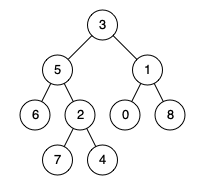Given the root of a binary tree and an array of TreeNode
objects nodes, return the lowest common ancestor (LCA) of all
the nodes in nodes. All the nodes will exist in the tree,
and all values of the tree's nodes are unique.
Extending the definition of LCA on Wikipedia:
"The lowest common ancestor of n nodes p1,
p2, ..., pn in a binary tree
T is the lowest node that has every pi as a
descendant (where we allow a node to be a descendant of
itself) for every valid i". A descendant of a
node x is a node y that is on the path from node
x to some leaf node.
Example 1:

Input: root = [3,5,1,6,2,0,8,null,null,7,4], nodes = [4,7] Output: 2 Explanation: The lowest common ancestor of nodes 4 and 7 is node 2.
Example 2:

Input: root = [3,5,1,6,2,0,8,null,null,7,4], nodes = [1] Output: 1 Explanation: The lowest common ancestor of a single node is the node itself.
Example 3:

Input: root = [3,5,1,6,2,0,8,null,null,7,4], nodes = [7,6,2,4] Output: 5 Explanation: The lowest common ancestor of the nodes 7, 6, 2, and 4 is node 5.
Example 4:

Input: root = [3,5,1,6,2,0,8,null,null,7,4], nodes = [0,1,2,3,4,5,6,7,8] Output: 3 Explanation: The lowest common ancestor of all the nodes is the root node.
Constraints:
- The number of nodes in the tree is in the range
[1, 104]. -109 <= Node.val <= 109- All
Node.valare unique. - All
nodes[i]will exist in the tree. - All
nodes[i]are distinct.